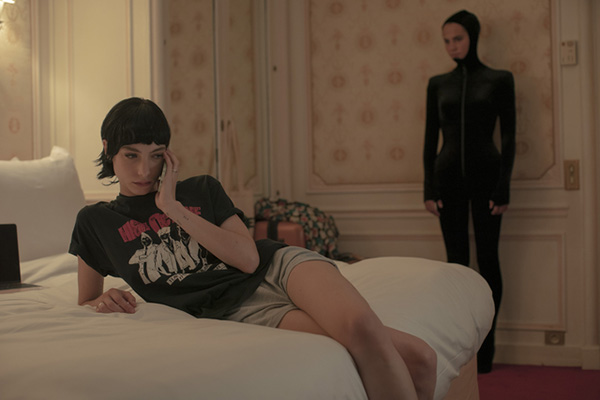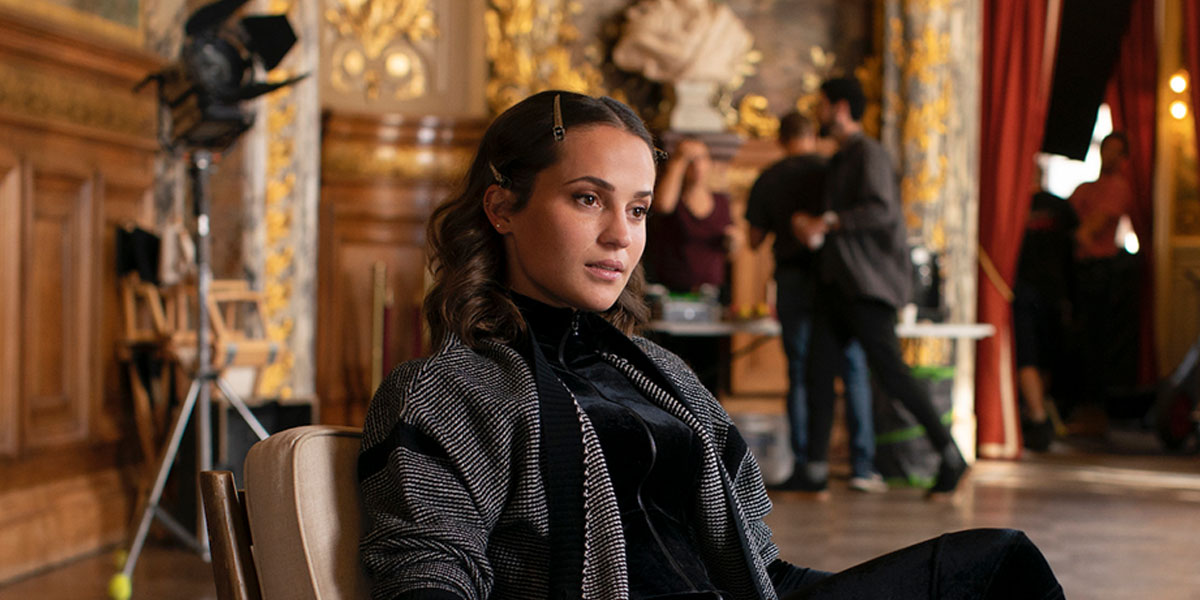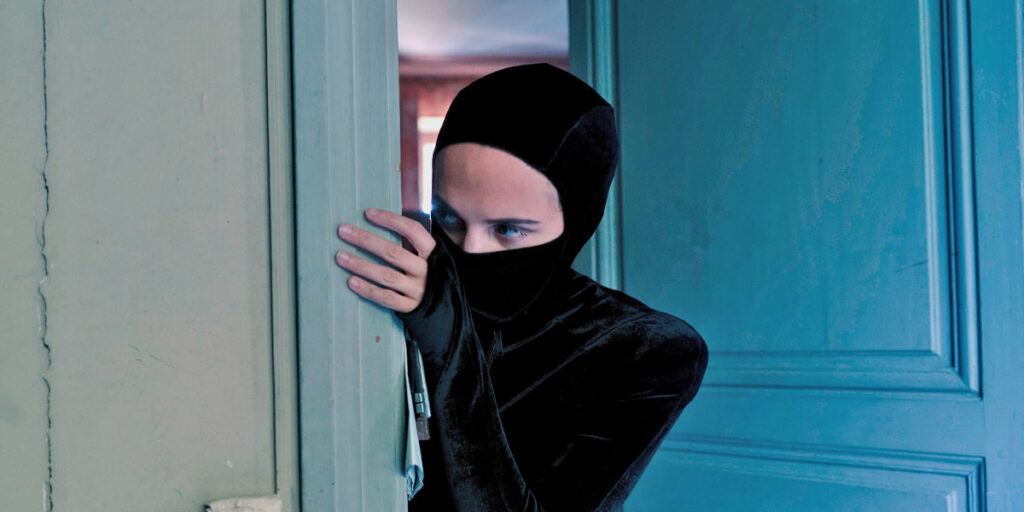Irma Vep remains highly acute, witty, and metatextual during episodes 5-8, as it covers broader and more complex themes in an entertaining and scintillating fashion.
Although I initially had “decades later modern remake” skepticism, the first four episodes of the limited-series rendition of Olivier Assayas’ 1996 classic, Irma Vep, were way better than anyone could have anticipated. The series covered plenty of topics that revolved around this generation’s vision towards TV-series production and filmmaking (blockbusters versus indie films, every fight on film Twitter, stan accounts, amongst other topics). In addition, its metatextual self was filled with plenty of irony and flair that hooked everyone who watched. Its cognizant mannerisms and magnetic dialogue made us laugh, think, ponder, and, on occasion, relate to the various characters one way or another. One might have thought that it would eventually lose steam in its latter half, because these types of series that revolve around self-referential dialogue or quips are hard to craft, especially in a lengthier format. After all, it can get tiresome if a show doesn’t lead anywhere. But the series is in good hands with Assayas at the helm, once again showing that he is one of the best international directors working today.
The people who know about Assayas’ work and appreciate it recognizes that it will always lead to a proper and suitable finale. Those who have seen the original Irma Vep realize we are getting some trippy and translucent visuals, and the thin lines between life and art will blend with one another. However, fans didn’t expect it to reach a more personal note, as Assayas reflects on his past relationships, his filmography, and legacy, as well as his visions of what may come for cinema. And these last four episodes remain engaging and scintillating but far more exciting and thematically rich than their introduction. This is a rare occasion in which a remake that nobody asked for, because they (me being one of them) hold the 1996 feature sacred, actually managed to surpass expectations and add more layers to the original work. After watching the series, you’ll notice how each episode showcases different essences of Hollywood personas (obsession, betrayal, addiction, arrogance, insolence, etc).
In the past, Assayas has presented these ideas in his projects, but individually. Each film (Clean, Non-Fiction, Demonlover, just to name a few) covered a different one of these personas, but they didn’t relate to the filmmaking world; it dealt with them in a grounded fashion, not disdained by the essence of Hollywood’s pretentiousness. By using those projects as references, Assayas develops them all into this lengthier project and correlates them to today’s Hollywood age, which is burdened by social media and the internet revolution. In Irma Vep, these arrogant, obsessive, and insolent personas are presented in different episodes and through various characters. For example, Lars Eidinger’s Gottfried represents the uproarious actor, who’s addicted to multiple compulsions (drugs, sex, etc), but on-screen, he’s dedicated. On the other hand, Vincent Lacoste’s Edmond is presented as an arrogant actor who doesn’t want to look like a fool on-screen; he wants serious roles and serious roles alone. Both are insolent in some way, shape, or form, and we have probably heard stories about actors behaving in such a manner while on set.

Of course, this being a comedic limited series, it exaggeratedly depicts them just to take the mickey out of them. Yet, the series has some scenes in which you understand why they act in such a manner. Those reasons might be questionable, but it makes space for you to emphathize with them. Then there are the other examples, like Devon Ross’ Regina, who’s one of my favorite characters in the series, being the voice of the new generation, Carrie Brownstein’s Zelda being the producer who always has an actor’s back, especially if there’s a lot of money or awards attached to it, and so on. Yet, what’s far more fascinating about the series is that it depicts such personas in a way that mocks them, yet not to the point of ridiculing them, and at the same time portrays them in a way that allows one to still empathize with the characters in the individual episodes. Of course, they all make questionable decisions behind each other’s backs, but the way Irma Vep develops causes you to question what you would have done in such a situation. What should I do if I’ve lost all my passion for a project? Should I tell her that I love her? Should I stay or should I go?
Even if the series centers around a tv production, these questions are relevant and relatable to everyone, no matter their line of work. As the end credits scroll, you start to think about the episode’s ending and wonder if you’ve experienced similar situations in the past. That’s the brilliance of Irma Vep, both the 1996 film and the modern-generation limited series: it makes you think about your own decisions and future, even if it is presented in a metatextual manner. There are a few self-referential films or series that make you feel like that; one of the few examples that I could mention that did that for me was Mia Hansen-Løve’s Bergman Island. And even so, Irma Vep still has more to offer besides that relatability factor. Reality and fiction (life and art) slowly become interchangeable through the character of Mira (elegantly played by Alicia Vikander), as she gradually embraces the essence of the character of Irma Vep. More characters from the series start appearing in the limited series being shot within the limited series as soon as that thin line between life and art begins to merge.
It’s interesting to see how slowly each character realizes they would be better off working on something else. Yet, at the same time, they stay with the project because they connect with their respective characters. They know it is a troublesome production; however, they decide to go with it no matter the cost. Since the series is now taking a more personal tone, albeit remaining as hilarious as before, the characters have more room to grow – show their true selves both on and off the camera. One of the problems the series has is that some of the characters that appeared a lot during the first episodes are set to the side to focus on the main characters as soon as the series wants to start completing the various character arcs, so they don’t feel incomplete in the grand scheme of things. Mostly, they don’t, but I did want to see more of them in the later episodes (five through 8).

 loudandclearreviews.com
loudandclearreviews.comVincent Lacoste’s Edmond and Jeanne Balibar’s Zoe don’t do much in the grand scheme of things, even though they are present for quite an amount of time during its beginning. It is hard to maintain every single character afloat during a limited series. Still, these were characters the viewers loved and enjoyed their presence, and unfortunately, they nearly vanished during those last episodes. But that’s the only grand issue I have with the series; the rest of it is extravagant and scintillating fun. The conversations about this generation’s views on cinema are further extended from one-liners to entire discussions between characters. It doesn’t nitpick on the same things as the previous episodes. Instead, it thoroughly presents conversations about sexualization in film or tv, tantrums and panic attacks on sets, therapy, and even how one’s experience might influence one’s work. Henceforth, episodes five through eight feel far more personal than the initial ones four. With the character of Vincent Macaigne, Assayas can conjure past experiences and explore them with wit, honesty, and sincerity.
Initially, we used to see Rene as a hilarious pompous oaf with exaggerated hand mannerisms. Still, as the series transgressed, we got to know him and what he has been through better, slowly appreciating his presence more and more, to the point where he became the highlight of the series – the best character in the series in my book. During the therapy sessions he goes through, we get that sense that it’s him speaking for Assayas (on some occasions – the non-witty ones): the way he expresses his opinions on cinema, life, and everything in between the two seems too personal not to be a representation of his own views. This also tends to happen when Devon Ross’ character, the charmingly deadpan and aloof Regina, speaks about the film. Her expressions about old Hollywood, low-budget filmmaking and the stylistic panderings of one Kenneth Anger seem too on-the-nose for it not to be Assayas sharing his two cents on each. There’s much to explore; the same happens with the original feature. The layers are plentiful, and all of them revolve around different aspects of filmmaking and how it relates to one’s own life decisions.
In the end, what’s deeply fascinating is how Assayas developed this project and how smoothly that premise was crafted into another medium – from film to tv. It’s always great to see a project greatly exceed your expectations and erase all your doubts about it. With sharp writing and stylistic direction, Olivier Assayas showcases the many faces of the modern generation of the filmmaking enterprise. Through the conversations the respective characters have, he constantly debates whether what’s coming for cinema in the next couple of years will be great or not. And as a fun, extra treat, Assayas and crew sneak in some Kenneth Anger, Carl Theodor Dreyer, and Andrei Tarkovsky references in some episodes. Oddly enough, I haven’t seen many people talking about Irma Vep, which annoys me because I think many people would adore this series, specifically cinephiles. Instead, it’s a series that keeps expanding itself into something more significant each time an episode ends. Instead of sticking to the same shticks, or a similar trajectory, Assayas reinvents Irma Vep for it to fit another medium with ease so that it can tackle the “problems” and comments surging from the modern generation’s thoughts on filmmaking in a highly hilarious and sincere fashion.
Irma Vep ‘s finale will be released on HBO Max on July 25, 2022. Read our review of the first half of the series.

